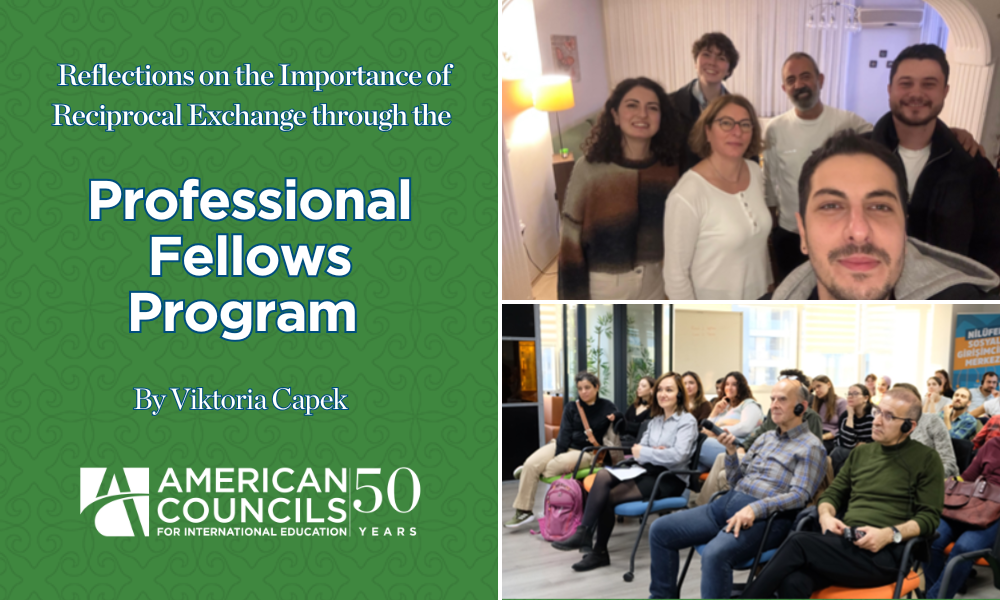Reciprocal international exchange programs provide American participants access to life-changing experiences. These people-to-people experiences enhance leadership and professional skills, and build lasting partnerships between emerging leaders from foreign countries and the United States that strengthen economic growth and innovation.
In November, Viktoria Capek, Communications and Development Manager at The Venture Center in Little Rock, Arkansas, implemented a Professional Fellows Program (PFP) reciprocal exchange project in Bursa, Türkiye. Working with PFP Fellow Zeliha Çürüksulu, Viktoria explored how connections and storytelling between cultures can serve as catalysts for global collaboration.
One Hand has No Sound, but Two Hands Make a Noise
By Viktoria Capek
I teach a course on classic literature, so I talk and write about Leo Tolstoy’s 1878 novel Anna Karenina more than the average person. Whenever I spell the title, I sound out all the syllables in “Karenina” similar to how many of us were taught to spell “Wednesday” as kids: “Wed-nes-day.” This habit started because the first time I said the name of Tolstoy’s first true novel out loud, I unknowingly pronounced it “Anna Kara-nina.”
English, like 78% of Americans, is my first language—yet I still can’t sound out some words the right way.
You can imagine how eye-opening—and mildly chaotic—it was to find myself in Türkiye, a country where I didn’t know a single word of the language. It wasn’t until I found myself relying on Google Translate to communicate with my driver during a two-and-a-half-hour ride from the Istanbul airport to the province of Bursa that I realized just how unfamiliar I was with Turkish.
The closest I’d come to learning it was asking my Turkish friend, Zeliha Çürüksulu, to teach me the occasional word months earlier. Zeliha and I had worked together during a four-week fellowship at my workplace, The Venture Center, in Little Rock, Arkansas. Incidentally, she was the reason for my visit to Türkiye. Together, we hosted a workshop and panel on Impact Communication for Social Change at her workplace, the Nilüfer Social Entrepreneurship Center.
Before the workshop, it was important to Zeliha and I that she show me some of Türkiye’s history and culture. We also ate a lot of food. I can honestly say I’ve never eaten so much lamb in one week. But I’m not complaining—if there’s one thing I love doing when I travel, it’s eating.

One of the most memorable meals was at Zeliha’s family home in Bursa. Her parents wanted to meet the American friend their daughter had worked so closely with in the United States—and who had now traveled overseas to work with her again.
After dinner, sitting in Zeliha’s small, tidy living room, I did my best to make conversation with her parents, who don’t speak any English. I started reviewing some of the Turkish words I had picked up during the week, including one phrase I’d written down in my iPhone’s Notes app.
The brief and confused silence, followed by laughter, after I read, “Bir elin nesi var, iki elin sesi var,” told me everything I needed to know about how well I pronounced the Turkish proverb.
The phrase loosely translates to, “One hand has no sound, but two hands make a noise.” The idea behind it is that working together achieves more than working alone, and I had written it down because it captured exactly the kind of work Zeliha and I were striving to do together.
We designed Impact Communication for Social Change to be a truly collaborative event. In partnership with The Venture Center, the Nilüfer Social Entrepreneurship Center, the Istanbul-based Yekpare Social Enterprise Union, and American Councils for International Education, we brought together more than 70 social entrepreneurs, change-makers, and communication professionals. The group included a few Americans (who participated online), but the majority were Turkish residents of all ages who were eager to learn how connection and storytelling could create change.
The heart of the workshop was breaking down the building blocks of impactful storytelling: character, challenge, and resolution. We talked about how tailoring your story to specific audiences can make them even more impactful.
The most engaging part of the event was a Q&A with two American experts in storytelling who spoke over a Zoom call. April Roy, the founder of femPAQ, talked about her experience as a social entrepreneur and how mission-driven storytelling has helped her address taboo topics. Darren Irby, the National Executive Director of Brand, Partnerships and Innovation for the American Red Cross, drew from more than 25 years of experience in crisis communication to offer advice on maintaining trust and transparency when addressing sensitive issues.
 One participant, who works closely with teachers and students in schools, asked how to find a central character when the teachers don’t want to be the focus. We discussed the idea of making the historic schoolhouses themselves a character or subject of the story and how focusing on their history and role in education could be the foundation of an interesting narrative.
One participant, who works closely with teachers and students in schools, asked how to find a central character when the teachers don’t want to be the focus. We discussed the idea of making the historic schoolhouses themselves a character or subject of the story and how focusing on their history and role in education could be the foundation of an interesting narrative.
After I read the proverb to Zeliha’s family—albeit poorly—I explained what I loved about it. Coincidentally, the phrase and the situation tied perfectly to one of the lessons I hoped participants of the workshop would walk away with.
Making a difference often starts with simply having conversations. Communication isn’t about saying everything perfectly—it’s about starting the dialogue to connect with someone else. And like the proverb says, “Two hands make a noise.” Connection can amplify even the simplest message and turn it into something that creates real change.

